Global Campus
Africa
The LLM/MPhil in Human Rights and Democratisation in Africa (HRDA)

Date & Place
1 January 2025, Pretoria
Duration
12 months
Requirements
Law degree (LLB) or Honours degree in a discipline relevant to human rights
Coordinator
Centre for Human Rights, University of Pretoria
A prestigious programme focused on the African continent, awarded by the University of Pretoria.
Overview
The LLM/MPhil in Human Rights and Democratisation in Africa (HRDA - GC Africa)
is a prestigious and highly competitive programme that aims to equip young professionals and human rights defenders with the necessary skills, knowledge and commitment to advance human rights and democratisation throughout the African continent.
The programme awards 200 credits through a blend of academic instruction and practical training; it involves field visit, internships, and a dissertation component, fostering a deep understanding of the challenges and opportunities within the region.
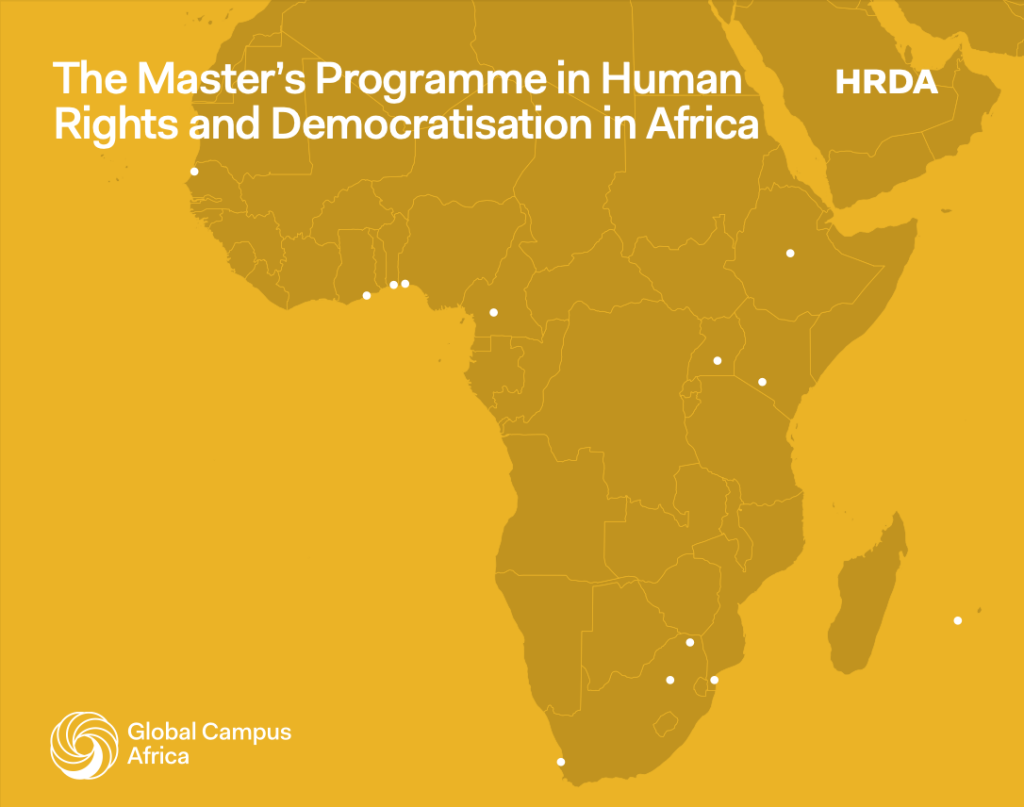
People
Regional Network
- University of Pretoria, South Africa — coordinator
- Université d’Abomey-Calavi, Benin
- Université Catholique d’Afrique Centrale, Cameroon
- Addis Ababa University, Ethiopia
- University of Ghana, Ghana
- University of Nairobi, Kenya
- University of Mauritius, Mauritius
- Universidade Eduardo Mondlane, Mozambique
- University of Lagos, Nigeria
- Université Gaston Berger de Saint Louis, Senegal
- University of Venda, South Africa
- University of the Western Cape, South Africa
- Makerere University, Uganda
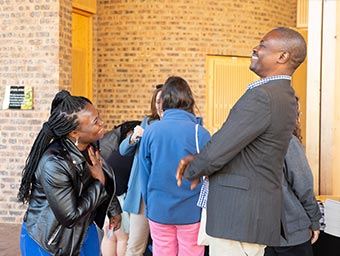
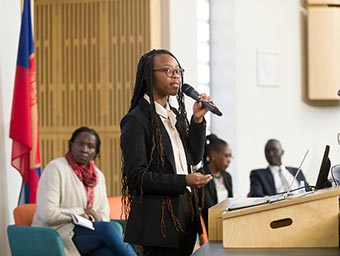
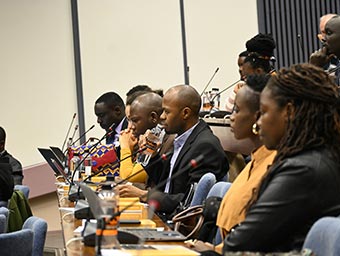
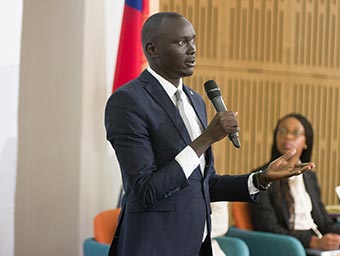
Programme Details
– 1st Semester: January to July | University of Pretoria
Students are taught by leading international human rights scholars and practitioners who place emphasis on classroom participation. Courses cover a wide range of topics, including:
- Module 1: Methodology of human rights research and education
- Module 2: Democratisation in Africa
- Module 3: International and comparative human rights
- Module 4: Human rights in Africa
- Module 5: Introduction to the South African legal system and Bill of Rights
- Module 6: Human rights in the field
- Language Module: French, English, Portuguese or Arabic
Throughout the first semester, each student is assigned to a ‘clinical group‘ which works on a practical human rights or democratisation issue. Students also undertake study visits and have a week set aside for field work where they in groups or individually investigates a human rights or democratisation issue.which works on a practical human rights or democratisation issue.
– 2nd Semester: August to December | Member Universities Across Africa
Students are placed at one of the universities in the GC Africa network (ideally not in their sub-region of origin), where they take an elective human rights-related module and further language classes, complete a supervised internship at a local human rights institution, and begin work on their dissertations.
- University of Pretoria (South Africa)
- Université d’Abomey-Calavi (Benin)
- Université Catholique d’Afrique Centrale (Cameroon)
- Addis Ababa University (Ethiopia)
- University of Ghana (Ghana)
- University of Nairobi (Kenya)
- University of Mauritius (Mauritius)
- Universidade Eduardo Mondlane (Mozambique)
- University of Lagos (Nigeria)
- Université Gaston Berger de Saint Louis (Senegal)
- University of Venda (South Africa)
- University of Western Cape (South Africa)
- Makerere University (Uganda)
University Degree: A law degree allowing access to the legal profession (e.g. LLB or licence en droit) or an Honours degree in a discipline relevant to human rights and democratisation
Academic Track Record: weighted average of at least 65% at final-year level
English Language Proficiency: for applicants who did not obtain their qualifications in English: TOEFL, SAT1 or IELTS Test certificate.
Motivation: demonstrated professional, academic and personal interest in human rights and democratisation in Africa; and an indication that the applicant would be likely to put the qualification to good use in his or her future career, preferably in his or her country of origin (the ‘multiplier effect’)
Representation: geographical (the programme has a pan-African scope), gender, and equitable representation of persons from vulnerable communities
Maximum Number of Accepted Students: 30
- US$ 15,000 (approximate cost)
- Up to 25 full scholarships are available for African citizens
HRDA has over 600 graduates who are active in the full spectrum of human rights work: from grassroots, through civil service, to international organisations. Many alumni occupy influential positions in NGOs, government agencies, and intergovernmental organisations across Africa and beyond, including chairpersons of the African Union’s two main human rights bodies, Chief Justices and Cabinet Ministers.
The Centre for Human Rights at the University of Pretoria is one of the most impactful networks on the African continent as evident in the mapping and stories highlighted in the GC Africa Alumni diaries, compiled every two years by the HRDA Alumni Association.
Are you ready to join a premier programme dedicated to exploring human rights from an African perspective? Learn more today!
HRDA: Building Leaders for Human Rights and Democracy in Africa
HRDA is a transformative programme that draws from the content, the progressive conversations on human rights, and the shared living experience. It is a gateway to a vast and dependable network of exemplary human rights defenders in almost every African country or African human rights institution.